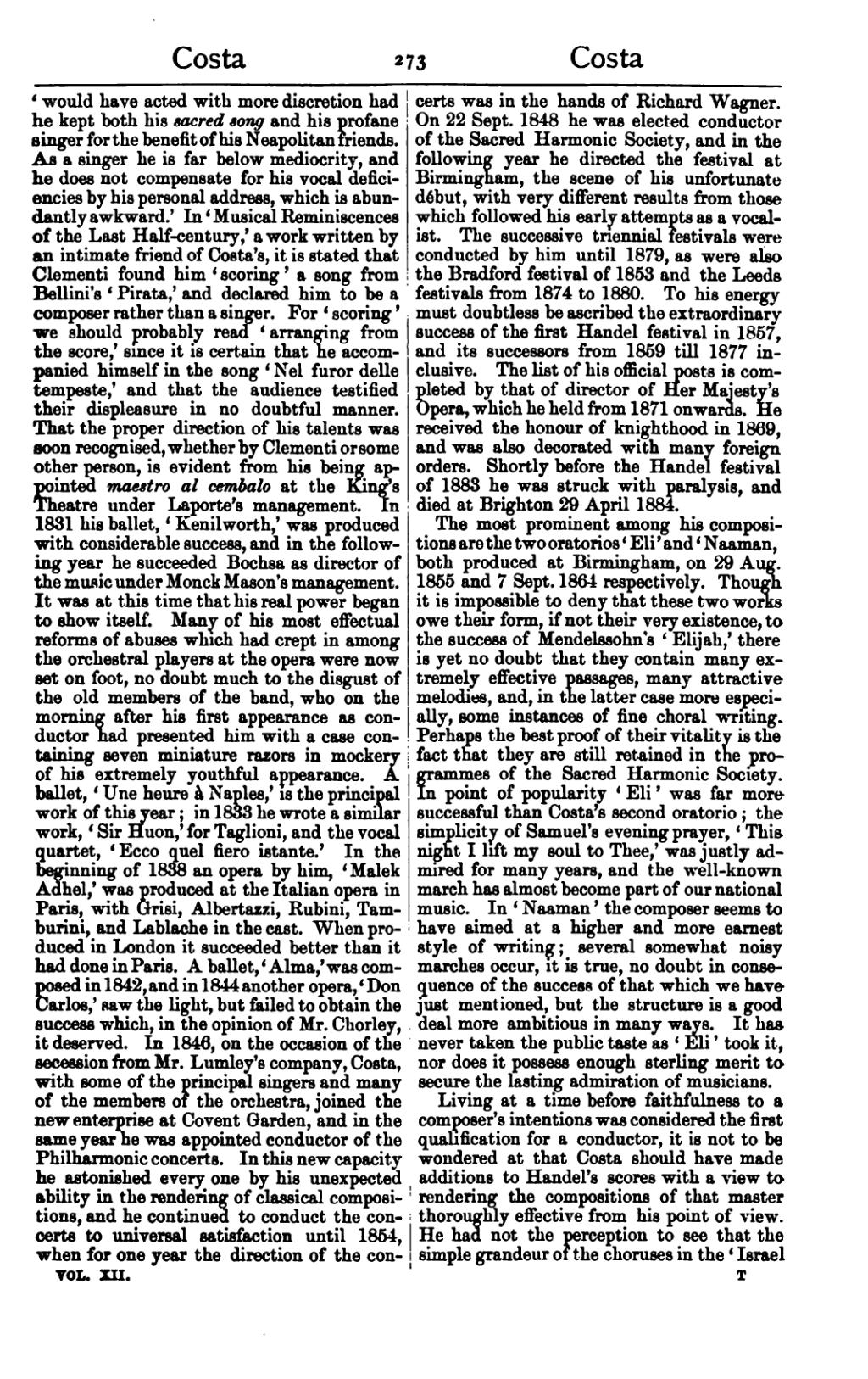‘would have acted with more discretion had he kept both his sacred song and his profane singer for the benefit of his Neapolitan friends. As a singer he is far below mediocrity, and he does not compensate for his vocal deficiencies by his personal address, which is abundantly awkward.’ In ‘Musical Reminiscences of the Last Half-century,’ a work written by an intimate friend of Costa's, it is stated that Clementi found him ‘scoring’ a song from Bellini's ‘Pirata,’ and declared him to be a composer rather than a singer. For ‘scoring’ we should probably read ‘arranging from the score,’ since it is certain that he accompanied himself in the song ‘Nel furor delle tempeste,’ and that the audience testified their displeasure in no doubtful manner. That the proper direction of his talents was soon recognised, whether by Clementi or some other person, is evident from his being appointed maestro al cembalo at the King's Theatre under Laporte's management. In 1831 his ballet, ‘Kenilworth,’ was produced with considerable success, and in the following year he succeeded Bochsa as director of the music under Monck Mason's management. It was at this time that his real power began to show itself. Many of his most effectual reforms of abuses which had crept in among the orchestral players at the opera were now set on foot, no doubt much to the disgust of the old members of the band, who on the morning after his first appearance as conductor had presented him with a case containing seven miniature razors in mockery of his extremely youthful appearance. A ballet, ‘Une heure à Naples,’ is the principal work of this year; in 1833 he wrote a similar work, ‘Sir Huon,’ for Taglioni, and the vocal quartet, ‘Ecco quel fiero istante.’ In the beginning of 1838 an opera by him, ‘Malek Adhel,’ was produced at the Italian opera in Paris, with Grisi, Albertazzi, Rubini, Tamburini, and Lablache in the cast. When produced in London it succeeded better than it had done in Paris. A ballet, ‘Alma,’ was composed in 1842, and in 1844 another opera, ‘Don Carlos,’ saw the light, but failed to obtain the success which, in the opinion of Mr. Chorley, it deserved. In 1846, on the occasion of the secession from Mr. Lumley's company, Costa, with some of the principal singers and many of the members of the orchestra, joined the new enterprise at Covent Garden, and in the same year he was appointed conductor of the Philharmonic concerts. In this new capacity he astonished every one by his unexpected ability in the rendering of classical compositions, and he continued to conduct the concerts to universal satisfaction until 1854, when for one year the direction of the concerts was in the hands of Richard Wagner. On 22 Sept. 1848 he was elected conductor of the Sacred Harmonic Society, and in the following year he directed the festival at Birmingham, the scene of his unfortunate début, with very different results from those which followed his early attempts as a vocalist. The successive triennial festivals were conducted by him until 1879, as were also the Bradford festival of 1853 and the Leeds festivals from 1874 to 1880. To his energy must doubtless be ascribed the extraordinary success of the first Handel festival in 1857, and its successors from 1859 till 1877 inclusive. The list of his official posts is completed by that of director of Her Majesty's Opera, which he held from 1871 onwards. He received the honour of knighthood in 1869, and was also decorated with many foreign orders. Shortly before the Handel festival of 1883 he was struck with paralysis, and died at Brighton 29 April 1884.
The most prominent among his compositions are the two oratorios ‘Eli’ and ‘Naaman,’ both produced at Birmingham, on 29 Aug. 1855 and 7 Sept. 1864 respectively. Though it is impossible to deny that these two works owe their form, if not their very existence, to the success of Mendelssohn's ‘Elijah,’ there is yet no doubt that they contain many extremely effective passages, many attractive melodies, and, in the latter case more especially, some instances of fine choral writing. Perhaps the best proof of their vitality is the fact that they are still retained in the programmes of the Sacred Harmonic Society. In point of popularity ‘Eli’ was far more successful than Costa's second oratorio; the simplicity of Samuel's evening prayer, ‘This night I lift my soul to Thee,’ was justly admired for many years, and the well-known march has almost become part of our national music. In ‘Naaman’ the composer seems to have aimed at a higher and more earnest style of writing; several somewhat noisy marches occur, it is true, no doubt in consequence of the success of that which we have just mentioned, but the structure is a good deal more ambitious in many ways. It has never taken the public taste as ‘Eli’ took it, nor does it possess enough sterling merit to secure the lasting admiration of musicians.
Living at a time before faithfulness to a composer's intentions was considered the first qualification for a conductor, it is not to be wondered at that Costa should have made additions to Handel's scores with a view to rendering the compositions of that master thoroughly effective from his point of view. He had not the perception to see that the simple grandeur of the choruses in the ‘Israel
